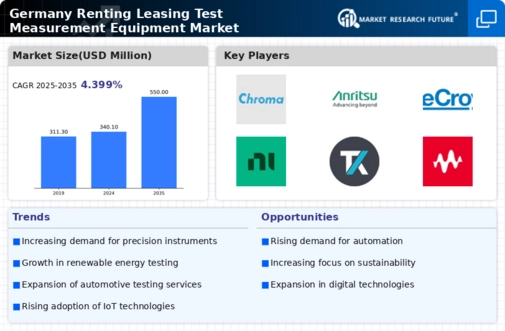Cost Efficiency and Budget Constraints
Cost efficiency remains a critical driver in the renting leasing-test-measurement-equipment market in Germany. With many companies facing stringent budget constraints, the ability to rent equipment rather than purchase it outright presents a financially viable alternative. This approach allows businesses to allocate resources more effectively, focusing on core operations rather than capital investments in equipment. Data indicates that approximately 50% of small to medium-sized enterprises (SMEs) in Germany prefer renting to manage their budgets more effectively. This trend is likely to continue, as firms seek to optimize their financial strategies while maintaining access to essential testing and measurement tools.
Growing Emphasis on Project-Based Work
The increasing prevalence of project-based work in various industries significantly influences the renting leasing-test-measurement-equipment market in Germany. As companies shift towards project-oriented operations, the need for specialized equipment on a temporary basis becomes more pronounced. This trend is particularly relevant in sectors such as construction and research, where specific testing equipment is required for limited durations. Recent surveys indicate that around 45% of project managers prefer renting equipment to meet their specific project needs without incurring long-term costs. Consequently, this shift towards project-based work is expected to drive growth in the renting leasing-test-measurement-equipment market as businesses seek to enhance their operational flexibility.
Increased Demand for Flexible Solutions
The renting leasing-test-measurement-equipment market in Germany experiences heightened demand for flexible solutions. Companies are increasingly seeking to minimize capital expenditures while maximizing operational efficiency. This trend is particularly evident in sectors such as telecommunications and automotive, where rapid technological advancements necessitate access to the latest testing equipment without the burden of ownership. According to recent data, approximately 40% of businesses in these sectors prefer renting over purchasing equipment, indicating a shift towards more adaptable operational strategies. This flexibility allows companies to respond swiftly to market changes, thereby enhancing their competitive edge. As a result, the renting-test-measurement-equipment market is likely to see sustained growth driven by this demand for flexibility.
Technological Advancements in Equipment
Technological advancements play a pivotal role in shaping the renting leasing-test-measurement-equipment market in Germany. The continuous evolution of testing and measurement technologies, such as automation and IoT integration, has led to an increased need for access to state-of-the-art equipment. Companies are often reluctant to invest heavily in rapidly evolving technologies, making renting an attractive option. Recent statistics suggest that around 30% of firms in the engineering sector utilize rental services to keep pace with technological changes. This trend not only reduces the financial burden associated with equipment ownership but also ensures that businesses remain competitive by utilizing the latest tools available in the market.
Environmental Considerations and Sustainability
Environmental considerations are increasingly shaping the renting leasing-test-measurement-equipment market in Germany. As companies become more aware of their ecological footprint, many are opting for rental solutions as a means to promote sustainability. Renting equipment reduces waste and encourages the efficient use of resources, aligning with the growing emphasis on sustainable practices across industries. Recent studies suggest that approximately 35% of businesses in Germany prioritize sustainability in their procurement strategies, favoring rental options that minimize environmental impact. This trend not only supports corporate social responsibility initiatives but also positions the renting leasing-test-measurement-equipment market as a key player in the transition towards more sustainable operational practices.

















Leave a Comment